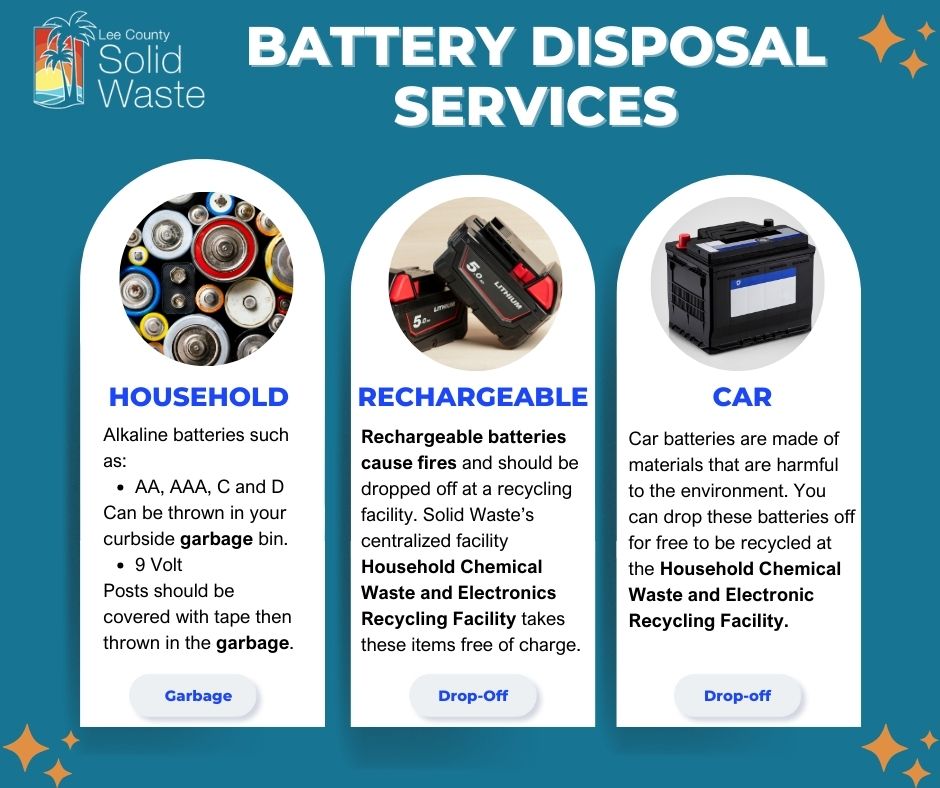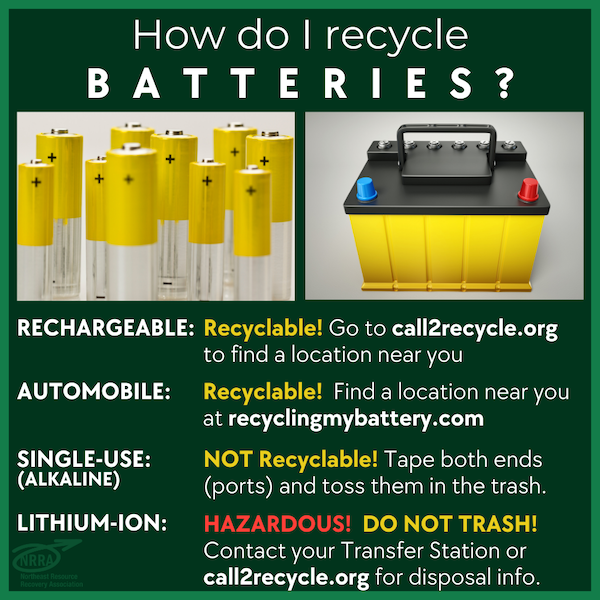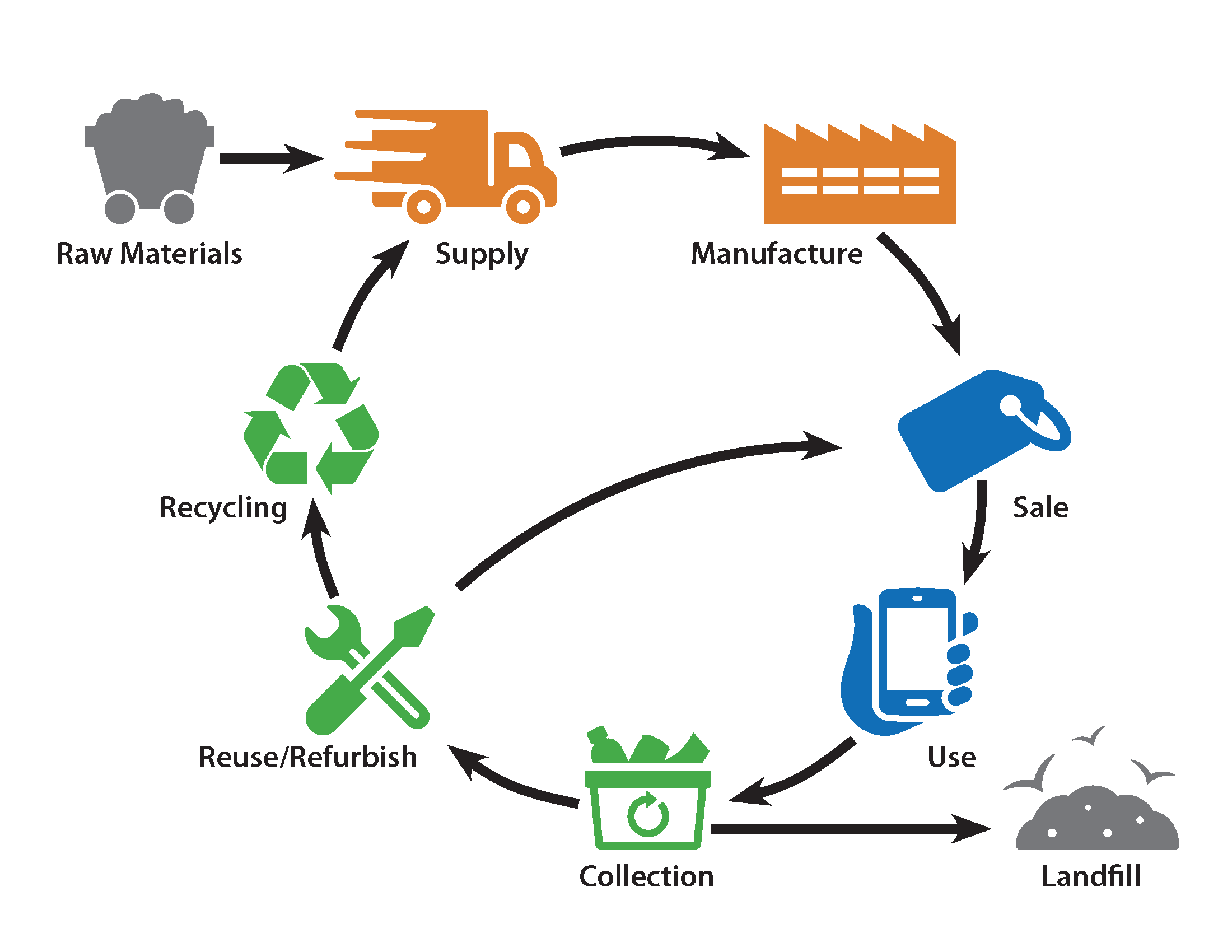Dispose lithium batteries safely to prevent harm. Follow proper steps to ensure environmental safety.
Lithium batteries power many devices. But they can be dangerous if not disposed of correctly. They contain chemicals that can harm the earth and water. Tossing them in regular trash is not safe. Understanding the right methods to dispose of lithium batteries protects both the environment and people.
This guide explores safe disposal practices. Learn where to take old batteries. Discover how recycling can benefit the planet. Proper disposal prevents pollution and conserves resources. Keep reading to find out the best ways to dispose of lithium batteries responsibly. Your actions can make a positive impact. Let’s dive into the details.
Introduction To Lithium Batteries
Lithium batteries power many of our everyday devices. From smartphones to laptops, these batteries are everywhere. They are known for their long-lasting power and efficiency. But what happens when they reach the end of their life? Proper disposal is crucial to prevent harm to the environment and human health. This guide will help you understand the importance and methods for disposing of lithium batteries safely.
Importance Of Proper Disposal
Proper disposal of lithium batteries is essential. These batteries contain hazardous materials. If discarded improperly, they can cause fires. Also, they can leak harmful chemicals. Safe disposal protects the environment and human safety. Many places have strict rules for battery disposal. Following these rules helps prevent accidents and pollution.
Environmental Concerns
Improper disposal of lithium batteries harms the environment. When thrown in regular trash, they can leak. This leakage can contaminate soil and water. Wildlife and plants can suffer from these toxins. Recycling centers can safely handle these batteries. They ensure that harmful materials are contained. Recycling also allows the recovery of valuable materials. This reduces the need for new raw materials.
Identifying Lithium Batteries
Proper disposal of lithium batteries prevents environmental harm. Identify them by their label indicating lithium or Li-ion. Take them to recycling centers or special collection sites for safe disposal.
Lithium batteries are everywhere—from your smartphone to your laptop and even your electric car. While they power your gadgets with efficiency and reliability, knowing how to identify them is crucial for proper disposal. Proper identification prevents environmental hazards and ensures safe handling. But how do you spot a lithium battery amidst a sea of others? Let’s dive into the details.
Common Types
Lithium batteries come in several types, each with unique characteristics. Lithium-ion (Li-ion) batteries are widely used in consumer electronics like phones and laptops. They are rechargeable and can last several years with proper care. Lithium polymer (LiPo) batteries are another variant, popular in drones and RC vehicles. They offer higher energy density, making them ideal for compact devices. Lithium iron phosphate (LiFePO4) batteries are often found in electric vehicles due to their safety and longevity. Each type has distinct markings on its casing, usually indicating its chemistry—keep an eye out for these clues.
Signs Of Depletion
How can you tell if a lithium battery is nearing its end? Look for signs like reduced performance. If your phone dies faster than it used to, the battery might be depleting. Physical changes are also telltale signs. Is the battery swollen or leaking? These are clear indicators that it needs disposal. You might notice overheating or strange smells when charging—these are red flags. Ensuring safe disposal at this point is crucial to prevent accidents or damage. Think about the last time your smartphone died unexpectedly. Did you wonder if the battery was to blame? Understanding these signs can prompt timely action, ensuring safety and efficiency. Don’t wait until it’s too late; check your gadgets regularly. What other signs have you noticed that indicate a battery is dying? Remember, identifying and disposing of lithium batteries responsibly is not just about following rules. It’s about ensuring safety—for you, your devices, and the environment.
Preparation For Disposal
Safely dispose of lithium batteries by first preparing them for disposal. Cover terminals with non-conductive tape to prevent short circuits. Store in a cool, dry place until you can take them to a designated recycling facility.
Before you dispose of a lithium battery, it’s crucial to prepare properly. This preparation not only ensures safety but also supports environmental conservation. Remember, lithium batteries have specific disposal needs, and mishandling them can lead to severe consequences. Let’s dive into the necessary steps for safe disposal.
Safety Precautions
Always prioritize safety. Ensure you wear protective gloves and goggles when handling lithium batteries. They can leak hazardous chemicals that may cause skin irritation or eye damage. Avoid storing batteries near flammable materials. Lithium batteries can become fire hazards if exposed to high temperatures or physical damage. Check for any signs of damage or leakage. If you notice any issues, handle the battery with extreme care and avoid direct contact.
Handling Guidelines
Handle lithium batteries with care. Avoid dropping or puncturing them as this can trigger dangerous reactions. Store them in a cool, dry place before disposal. Extreme temperatures can affect their stability and increase risks. Label batteries clearly if damaged. This helps disposal professionals identify and manage them safely. Have you ever wondered why proper disposal is necessary? Mishandling can lead to environmental pollution and health risks. By following these guidelines, you contribute positively to a safer and greener environment.
Credit: www.spokanecounty.org
Recycling Options
Lithium batteries power many of our everyday devices. Proper disposal is crucial. Recycling not only helps the environment. It also reduces waste and recovers valuable materials. Explore various recycling methods to ensure safe disposal.
Local Recycling Centers
Local recycling centers offer a convenient way to recycle lithium batteries. Many centers accept batteries from the public. They ensure safe handling and disposal. Check your area for nearby facilities. Call ahead to confirm they accept lithium batteries. Some centers might have specific drop-off days or times.
Mail-in Programs
Mail-in programs provide another option for lithium battery recycling. These programs often offer pre-paid shipping options. This makes it easy to send batteries from home. Companies like Call2Recycle offer mail-in services. They specialize in battery collection and recycling. Using mail-in programs is simple. Pack your batteries securely and send them off. This ensures they reach the right recycling facilities.
Alternative Disposal Methods
Disposing of lithium batteries responsibly is crucial for our environment. Traditional methods often lead to pollution and harm wildlife. Thankfully, alternative disposal methods are available. These methods ensure safe handling and recycling of batteries. They also help in conserving valuable resources. Let’s explore some effective options.
Retail Take-back Programs
Many retailers now offer take-back programs. These programs allow consumers to return used batteries. Stores like Best Buy and Home Depot participate. They have drop-off bins for easy disposal. This service is free and convenient for everyone. It also supports recycling efforts by manufacturers. Using these programs reduces waste in landfills. It promotes safer environmental practices.
Community Collection Events
Local communities often host collection events. These events gather hazardous waste, including batteries. They provide an opportunity for safe disposal. Residents can drop off their old lithium batteries. Communities then ensure proper recycling or disposal. Check local websites for event dates and locations. These events are crucial for reducing local waste impact. They also educate the public on responsible waste management.

Credit: www.leegov.com
Legal Regulations
Understanding legal regulations for disposing of lithium batteries is crucial. These laws ensure safety and environmental protection. Legal guidelines vary by region, affecting how you dispose of lithium batteries. Knowing these rules helps you avoid penalties and supports eco-friendly practices.
Government Policies
Government policies guide the safe disposal of lithium batteries. Each country may have specific regulations. Many require recycling to prevent environmental harm. Some regions have dedicated drop-off locations for battery disposal. Check local laws to ensure compliance. Proper disposal prevents hazardous waste issues. It also promotes resource recovery and sustainability.
Penalties For Improper Disposal
Improper disposal of lithium batteries can lead to penalties. Fines vary based on jurisdiction and severity. Penalties serve as a deterrent against illegal dumping. They emphasize the importance of following disposal regulations. Ignoring these rules can harm the environment and public health. Stay informed about local penalties to avoid legal consequences. Proper disposal practices protect both nature and society.
Innovations In Battery Recycling
Battery recycling is crucial for sustainability. Innovations are making it more efficient. New technologies aim to reduce waste. They ensure valuable materials are recovered. This benefits both the environment and the economy.
Technological Advances
Modern technology has improved recycling processes. Robotics now play a crucial role. They sort and dismantle batteries with precision. This minimizes human error and increases safety.
Advanced chemical processes extract more materials. Lithium, cobalt, and nickel are recovered efficiently. This reduces the need for new mining. It also conserves natural resources.
Sustainable Practices
Sustainability is at the heart of recycling. Companies now focus on eco-friendly methods. They aim to lower their carbon footprint. Renewable energy powers many recycling plants.
Closed-loop systems are gaining popularity. They recycle and reuse materials within the same company. This reduces waste and supports a circular economy. Such practices set a benchmark for the industry.

Credit: www.nrrarecycles.org
Consumer Responsibility
Proper disposal of lithium batteries protects the environment. Take them to designated recycling centers. Avoid throwing them in regular trash to prevent harmful chemical leaks.
### Consumer Responsibility As consumers, we have a critical role in ensuring the safe disposal of lithium batteries. These batteries power many of our devices, from smartphones to electric cars, but they can be hazardous if not disposed of properly. Understanding your responsibility in this process is crucial for both environmental sustainability and community safety. ####
Educating The Public
Knowledge is power. Many people are unaware of the dangers that improper battery disposal poses to the environment. Have you ever thought about where your old phone batteries end up? Share what you learn with friends and family. It’s surprising how a simple conversation can spark awareness and encourage others to act responsibly. The more we talk about it, the more conscious choices we can make. Governments and organizations play a part too, but you can lead by example. Participate in local workshops or online forums that educate about safe battery disposal. Your involvement can inspire others to learn and contribute. ####
Encouraging Proper Practices
Proper disposal practices are straightforward and impactful. Use designated recycling bins for batteries, often found in stores or community centers. Have you noticed them during your last shopping trip? Create a habit of collecting old batteries in a container at home. Once it fills up, take it to a recycling point. This small step can significantly reduce the risk of pollution and accidents. Think about how you can influence your workplace or school. Suggest implementing battery recycling programs if they don’t already exist. Your proactive approach can lead to collective action, making a substantial difference. In embracing these responsibilities, you not only protect the planet but also set a precedent for future generations. Are you ready to take charge of your consumer responsibility?
Future Of Battery Disposal
Proper disposal of lithium batteries is crucial for safety and environment. Take them to designated recycling centers. Avoid throwing in regular trash to prevent hazards.
The future of battery disposal is a critical topic as we shift towards a more sustainable and tech-driven world. With the rise in electronic devices and electric vehicles, lithium battery disposal has become a pressing issue. How we manage this can have a lasting impact on our environment and resource availability. It’s essential to look ahead at what’s next in this field and consider the emerging trends and developments, as well as the long-term solutions.
Trends And Developments
The current trends in battery disposal are promising. More companies are investing in recycling technologies to reclaim valuable materials from spent batteries. This not only conserves resources but also reduces the need for mining, which can be environmentally damaging. Governments around the world are implementing stricter regulations on battery disposal. They’re encouraging manufacturers to design batteries that are easier to recycle. Have you noticed newer electronic devices with removable batteries? This trend is part of a larger push towards sustainable design. New methods in battery disposal are being researched. Innovations like biotechnological solutions are being tested to break down lithium batteries more safely and efficiently. Could these advancements be the key to a greener future?
Long-term Solutions
For a sustainable future, long-term solutions are essential. One approach is the development of a circular economy for batteries. This involves designing products that can be reused, repaired, or recycled—minimizing waste and maximizing resource use. Education plays a critical role in long-term solutions. By increasing awareness about the importance of proper battery disposal, we can reduce environmental harm. Consider how a simple act, like dropping off your used batteries at a designated recycling center, contributes to the bigger picture. Collaboration between industries, governments, and consumers is crucial. By working together, we can establish more efficient recycling systems and invest in research for better disposal techniques. Are you ready to be part of the solution? The future of battery disposal is not just a responsibility of industries and governments—it’s also in your hands. How will you contribute to this change?
Frequently Asked Questions
How Are Lithium Batteries Disposed?
Dispose lithium batteries at designated recycling centers. Avoid regular trash to prevent environmental hazards. Check local guidelines for battery disposal. Proper disposal ensures safe handling and recycling. Follow instructions to protect the environment and reduce waste.
How To Dispose Of Lithium-ion Batteries At Home?
Dispose of lithium-ion batteries at designated recycling centers. Contact local waste management for guidance. Never throw them in regular trash.
Does Home Depot Take Lithium Batteries?
Home Depot accepts lithium batteries for recycling at most locations. Customers can drop off used batteries at designated recycling bins. It’s part of their commitment to environmental sustainability. Check your local store for participation in the recycling program.
How Do I Dispose Of Batteries In Wisconsin?
Dispose of batteries at designated recycling centers or hazardous waste facilities in Wisconsin. Check local guidelines for specific disposal instructions. Avoid throwing batteries in regular trash to prevent environmental harm. Many retailers and municipal locations offer battery recycling programs to ensure safe disposal.
Conclusion
Proper disposal of lithium batteries protects the environment. These batteries contain harmful chemicals. Recycling is the best option. Find a local recycling center. They safely handle lithium batteries. Avoid throwing them in the trash. Dispose of them responsibly. This prevents pollution and health risks.
Ensure your community stays clean. Encourage others to recycle too. It’s easy and beneficial. Every small action helps our planet. Remember, safe disposal saves lives and nature. Always choose the responsible path. Make a difference by recycling lithium batteries today.
Your efforts count towards a sustainable future.
